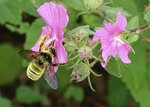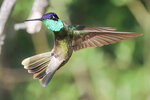

The Acton Nature Center will soon be “buzzing” with excitement, as community members come together for the latest community lecture series on pollinators.
Set for 2 p.m. Sunday, Oct. 6 at the Opal Durant Acton Community Center at 6430 Smoky Hill Court, ANC's lecture will dive into the vital role of pollinators and discuss how we can unite as a community to support their sustainability in our own backyards.
Pollinators, like bees and butterflies, facilitate the reproduction of plants by transferring pollen from one flower to another — playing a crucial role in the health of ecosystems and food production. Pollinators are a necessary component of sustaining life on Earth for all species, including humans. However, with numerous threats such as habitat loss, pesticide use and climate change, pollinator populations are in decline, putting both ecosystems and food security at risk.
Wendy Moore, a Texas Master Naturalist from the Rio Brazos Chapter, will serve as guest speaker for the ANC lecture, where she will share her journey of transforming her yard into a pollinator-friendly garden.
“I have always been concerned with environmental issues,” Moore told the Hood County News. “I was inspired by the two-part lecture given by Dr. Billy Teels at the Acton Nature Center Lecture Series in January and April 2023, where he talked about his efforts to restore his property with native grasses. I had been turning my yard into a pollinator garden and thought my example as a homeowner could be instructive and I hoped, inspirational (for the lecture).”
Moore noted that pollinators come in various forms, including insects, mammals and birds, but her lecture will primarily focus on insects.
“Pollinators are required by many plants to reproduce, and some of these have evolved to work with only one species of pollinator,” she explained. “The gardens I have been planting are intentionally grown for wildlife in general and specifically for insect pollinators and butterflies and moths.”
Moore emphasized that pollinators play a crucial role as both keystone and indicator species. While keystone species are essential to the stability of their ecosystems, their removal can lead to significant ecological changes. Indicator species, on the other hand, provide valuable insights into environmental shifts and serve as early warning signs for ecosystem health due to their sensitivity to changes.
A big threat to pollinators, Moore said, is the widespread use of pesticides in commercial scale agriculture. She added that it’s also becoming increasingly difficult to find interconnected natural habitats due to the widespread conversion of land for agriculture, housing, urban development, roads, parking lots, shopping centers, and, notably, manicured lawns that fail to support pollinators.
"Our natural environments and food sources are in jeopardy without pollinators and we could find ourselves in dire trouble if pollinators start disappearing,” she explained.
With pollinators facing serious threats, Moore explained that whole ecosystems could soon be in trouble.
According to the United States Department of Agriculture, about 35% of the worlds’ crops depend on pollinators to reproduce — which means that one in every three bites of food we consume is entirely dependent on these essential creatures.
“Pollinators are vital to natural environments and to us,” Moore said. “There is a lot of attention paid to nonnative honey bees but native pollinator species are so very important and I would like to bring that message to the public and encourage each and every person to help."
Moore explained that she has been developing her gardens for several years and has ambitious plans for the future. She encourages individuals to make their own choices about what to plant or remove and said she plans to share her own experience as a model for others.
"I have seen so many changes in my yard since I began this project,” she said. “I document what species come to my yard and am up to 45 species of birds and 39 species of butterflies and moths and counting! I enjoy the sounds of bees buzzing and the joy of seeing birds successfully raise their broods. Even the smallest efforts can yield big results and bring pollinators to anyone's porch or yard.”
With 15 years as a Texas Master Naturalist in the Rio Brazos Chapter, Moore said she continues to learn more about environmental issues and Texas land stewardship. Through her volunteer efforts with state and public parks, she said she has seen the effects of overused land returned to a more natural state. She added she has also observed the return of various plant and animal species and said she appreciates the importance of restoration and caring for land.
"There are lots of environmental problems out there,” Moore said. “Sometimes it can all seem overwhelming but there really are a lot of things that an individual can do that will make a real difference. While you are out there making that difference you have the added benefit of getting to enjoy the beauty that you create.”
The ANC pollinator lecture will be open to the public. Those interested in attending via Zoom can register for the link by sending an email to actonnaturecenter@gmail.com.
As the community gathers Oct. 6 to explore the essential role of pollinators, Moore hopes to inspire individuals to take action in their own yards, as together, we can “bee” the change.